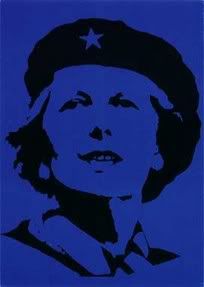We know how to work the machine
 So, the great Thatcher came to visit yesterday. Why, I ask myself, does a former women’s college such as Somerville, with its proud tradition of supporting women and education, want to allow such an alumnus to darken its doorstep?
So, the great Thatcher came to visit yesterday. Why, I ask myself, does a former women’s college such as Somerville, with its proud tradition of supporting women and education, want to allow such an alumnus to darken its doorstep?Let’s look at education. Leaving aside the milk snatching and so on, under Thatcher, secondary schools were given greater power to select pupils and parents greater power to choose schools for their children, inevitably leaving certain schools in the position of being “sink” schools. Whilst banning “political indoctrination” (such as peace studies courses) in schools, Tory education policies at the same time insisted that sex education be taught within the moral framework of the family, thus arguably using education to indoctrinate children with a particular ideal of social structures. (Thatcher’s government also introduced the notorious Section 28 of the Local Government Act, 1988, which banned schools from teaching the acceptability of homosexuality as a “pretended family relationship”) The same could be said of the introduction of the requirement for predominantly Christian acts of worship to be held regularly in schools, even those whose population was overwhelmingly non-Christian. Under Thatcher, Kenneth Baker introduced the National Curriculum, arrangements for testing and League Tables, and school inspections by OFSTED. I’ve never met a teacher who thought any of this was a particularly good idea. It stifled creativity, and introduced an unprecedented level of stress and anxiety into both teachers and pupils. Memories of even the most genial teachers turning into Attila the Hun as inspection day loomed are, I’m sure, part of the consciousness of my generation.
And what about women? Well, Thatcher certainly did provide us with our first female Prime Minister, proving that women could gain positions of authority and power. But what did she do for women? Over eleven years, her Cabinet was made up exclusively of men (with the brief exception of Baroness Young). She condemned working mothers, froze child benefit and put tax on tampons as a “luxury item”. Perhaps worst of all, she claimed that “The battle for women's rights has been largely won”, and yet women are still earning on average only 85% of male earnings, with women in part-time work earning 40% less than men. Only 18% of MPs are women - they make up only 9% of Tory MPs, as opposed to 23% in Labour.

“I owe nothing to Women's Lib”, she announced. This coming from a woman who became Prime Minister, when her near ancestors didn’t even have the right to vote.
So, should Somerville welcome such an old member back to the fold? Or should it rather sweep her memory under the carpet as a slightly embarrassing alumnus-gone-bad? It’s a difficult call.
Links: "Do Thatcher's words still matter?" - BBC Online; Thatcher Foundation - online texts of thousands of political documents
Images from gatheredimages


0 Comments:
Post a Comment
<< Home